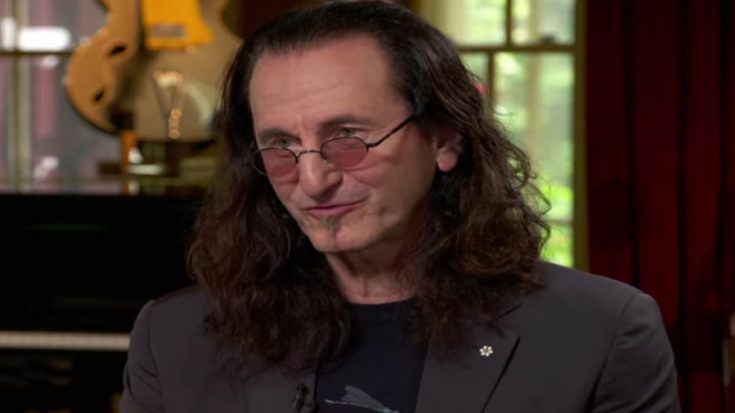Geddy Lee Believes There’s One RUSH Song That Is Lousy

via Jeff Lee / YouTube
Rush’s iconic bassist and lead vocalist Geddy Lee has always been one of rock’s most outspoken figures. Over the course of his career, he has openly shared a wide range of perspectives on his artistic endeavors, encompassing both profound reflections and critical evaluations.
The frontman of the Canadian prog-rock giant never minces his words even if the subject was his own work. He famously pegged 1975’s Caress of Steel as Rush’s worst album, and he has not waned in his evaluation even to this day.
Caress’ follow-up, 2112, was enormously influential in contrast. It was too great, and too far a leap for their sound, that Geddy even admitted that he could never listen to anything from before the iconic prog-rock masterpiece.
Though the bassist was one to never regret any of his musical endeavors, there was one song from Caress of Steel that still makes him cringe: the lousy (and boringly titled) “Lakeside Park”.
“What a lousy song!”
Lee’s unfavorable review of the song was featured in a 1993 interview with Raw Magazine, where he talked about some of the early stuff that he was proud of.
“A lot of the early stuff I’m really proud of. Some of it sounds really goofy, but some of it stands up better than I gave it credit for,” the frontman shared.
The formidable bassist also found it cringey to hear his own ‘weird’ voice from Rush’s pre-2112 songs, though he added that he liked some of the song arrangements. Lee admitted though that listening to the band’s old tracks is “a bit hairy” for him.
“If I hear “Lakeside Park” on the radio I cringe. What a lousy song! Still, I don’t regret anything that I’ve done, the frontman remarked.
https://twitter.com/ProgjectMusic/status/1711956002889768960
Without Caress Of Steel, there’d be no 2112
Even though the album marked a significant shift in their musical style, transitioning from a more straightforward form of blues-based hard rock to a more progressive approach, its somber tone and unconventional tracks failed to connect with the audience. The sales were so lackluster that their record label, Mercury, contemplated the possibility of dropping the band altogether.
In a 1980 interview with Guitar Player, Rush guitarist Alex Lifeson, reflected on this important period and disclosed that it was the only instance when he had thought about leaving the band. Fortunately, he decided against it.
Acknowledging the intricate role that the album played in their journey, he commented, “Without Caress Of Steel, we couldn’t ever have done 2112. And the latter, for us, was like coming back with a vengeance.”
Lifeson went on to say that, following Caress Of Steel, they faced a choice: to conform and yield to external pressures or to pursue their artistic instincts and defy the critics. Rush chose the latter path, “and we came back punching with 2112. That album still feels like that to me when I listen to it today – I can feel the hostility hanging out.”
https://twitter.com/oriettamusic/status/1441352089075007496
A bold musical leap
Caress of Steel, the third studio album by the Canadian prog rock legends, saw its release on September 24, 1975, through Mercury Records. This album marked a significant transformation in the band’s musical style, as it shifted away from the blues-based hard rock of their debut toward a more progressive rock sound.
However, this change turned out to be a low point in Rush’s career, both in terms of commercial success and critical reception. The album’s darker tone and inventive compositions initially failed to resonate with audiences and left some of the band’s contemporaries bewildered.
Despite the label’s pressure and the lukewarm reception of Caress of Steel, Rush defied their record label’s advice and resolved to “fight or fall”. They continued on their progressive rock path, eventually releasing the album 2112 the following year.
This album would prove central in their enduring commercial success, even if it featured a blistering 20-and-a-half-minute conceptual title track as its opener.













